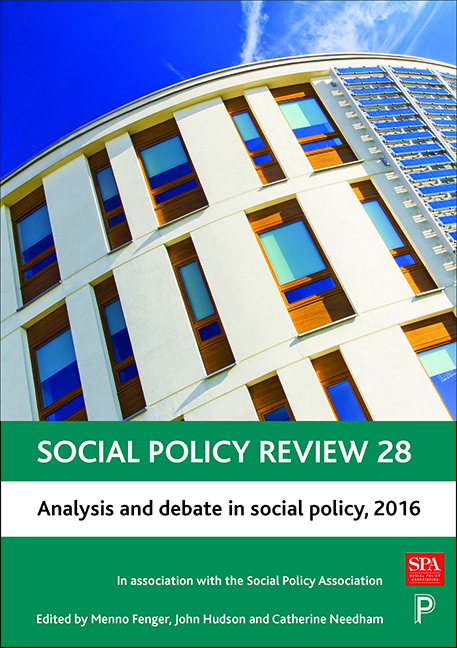Part Two - Contributions from the Social Policy Association Conference 2015
Published online by Cambridge University Press: 05 April 2022
Summary
Traditionally, Part Two of Social policy review draws together a selection of papers from the Social Policy Association's Annual Conference. The 2015 conference, hosted by the University of Ulster, addressed a wide range of issues under its umbrella theme ‘Social Policy in the Spotlight: Change, Continuity and Challenge’.
Capturing the mood of the conference is a challenging task to the say least. But, as the conference organisers observed in their programme notes, the social policy implications of the outcome of the 2015 UK General Election was a major issue facing delegates. Indeed, the final day of the conference coincided with the new government's first budget, during which details of the £12 billion of ‘welfare’ cuts promised during the election campaign were outlined. The four chapters in Section Two offer insights into what this agenda might hold and how scholars might best interrogate it.
In Chapter Five, Robert Page explores the development of a ‘progressive neo-liberal conservative’ narrative under David Cameron's leadership. As he shows, in shifting the Conservative Party's narrative to embrace key social justice agendas from a non-egalitarian and more individualist perspective, Cameron has not only allowed the Conservatives to present themselves as being sympathetic to progressive ends but also to move the terms of debate to the efficacy of Labour's (more statist) means.
Ruth Patrick picks up many of these themes in Chapter Six. Her interviews with out-of-work benefit claimants found many were angered by the impacts of Cameron's welfare reforms on their own lives but nonetheless were supportive of the government's broad agenda. She suggests that this underlines the depth of a ‘new moral consensus on welfare’ that problematises out-of-work benefits and those who claim them. In such an environment, ‘it is very difficult for individual claimants to make a positive case for “welfare” in general terms’, which, in turn, helps further embed the Conservatives’ welfare reform narrative.
In Chapter Seven, Stephen Crossley analyses the Troubled Families Programme. He shows the reality of the programme is rather different from the runaway success story presented by government, positive outcomes often owing ‘much to local officers’ negotiation and subversion of the programme’. Discretion built into the programme has allowed subversion and resistance to occur, but, as Crossley notes, ‘these transgressions […] occur under the radar and do little to trouble the national narrative of an assertive central government policy working successfully with troublesome families’.
- Type
- Chapter
- Information
- Social Policy Review 28Analysis and Debate in Social Policy, 2016, pp. 87 - 88Publisher: Bristol University PressPrint publication year: 2016



